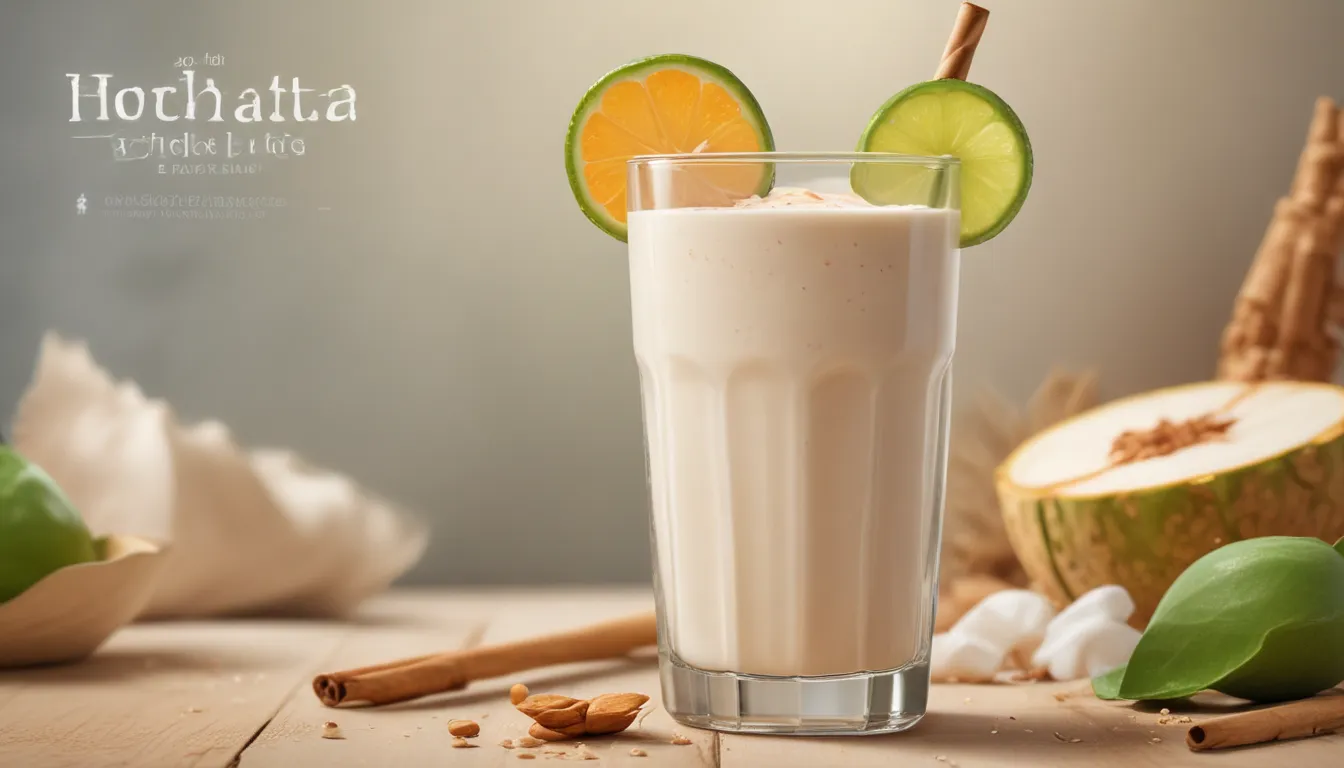The pictures in our articles might not always show exactly what the text is talking about. We use these images to make the article more interesting and eye-catching. They are there to add to the text, but not to replace it or show every detail.
Are you a fan of the exotic, creamy, and subtly sweet horchata beverage that has taken the world by storm? Discover the fascinating world of horchata and unveil its hidden nutritional treasures in this informative article. From its origins to its calorie count, this beloved drink has a lot to offer in terms of health benefits. Let's explore 12 intriguing nutrition facts about horchata that will surely pique your interest and inspire you to enjoy this delightful drink with a new perspective.
Horchata: A Brief History
Let's start our journey by tracing the origins of horchata. This delightful drink has its roots in Valencia, Spain, where it was born and later adopted by various cultures, particularly in Mexico and other Latin American countries. While the recipes may vary, the core ingredients of rice, almonds, sugar, and cinnamon remain central to horchata's unique character and flavor profile.
Nutritional Profile of Horchata
Calorie Content
A standard 12 oz. cup of horchata contains approximately 210 calories, making it a more substantial option compared to some sodas like Coca-Cola and Dr. Pepper. Despite its calorie content, horchata offers a range of essential nutrients that contribute to its overall nutritional value.
Fat Content
In a serving of horchata, you'll find 4.5 grams of total fat, with 3 grams being saturated fat. The good news is that these fats primarily come from almonds, a key ingredient in horchata. Almonds are rich in monounsaturated and polyunsaturated fats, which are beneficial for heart health when consumed in moderation.
Sugar Content
Horchata can contain anywhere between 22-26 grams of sugar per cup, slightly exceeding the recommended daily sugar intake of 25 grams. To enjoy a healthier version, opt for options with less added sugar or consider making your own horchata at home to control the sweetness level.
Carbohydrates and Protein
A typical serving of horchata provides around 39 grams of carbohydrates, offering a decent source of energy and a quick pick-me-up. Additionally, a cup of horchata contains 4.5 grams of protein, derived from the milk used to make the drink. The protein content may vary based on the type of milk utilized in the recipe.
Health Benefits of Horchata
Antioxidant Rich
The combination of almonds and cinnamon in horchata contributes to its antioxidant content. Antioxidants play a crucial role in protecting the body's cells from damage caused by free radicals, potentially reducing the risk of chronic diseases.
Cinnamon’s Benefits
Beyond its flavorful presence in horchata, cinnamon offers numerous health benefits, including anti-inflammatory properties and potential regulation of blood sugar levels. Incorporating cinnamon into your diet can have positive effects on overall health and well-being.
Hydration Support
Given its high water content, horchata can help meet your daily hydration needs. Proper hydration is essential for maintaining optimal health and supporting various bodily functions, making horchata a refreshing and hydrating beverage choice.
Nutrient Content of Horchata
Vitamin E Source
Thanks to the inclusion of almonds, horchata serves as a source of Vitamin E, a powerful antioxidant that supports immune function, cell protection, and skin health. Including horchata in your diet can help you reap the benefits of this essential nutrient.
Calcium and Magnesium
Horchata made with fortified rice milk can be a good source of calcium (15% DV) and magnesium (10 mg), crucial minerals for bone health and overall well-being. However, the nutrient content may vary based on the type of rice milk used, so always check the nutritional information for accurate details.
Vegan-Friendly and Dairy-Free
Traditional horchata is typically vegan-friendly, making it an excellent choice for individuals following a plant-based diet. Additionally, horchata is naturally dairy-free, with rice milk serving as the primary dairy substitute. It's essential to verify the ingredients used in horchata to ensure it aligns with your dietary preferences and restrictions.
Final Thoughts on Horchata’s Nutritional Value
After exploring the diverse nutritional aspects of horchata, it's clear that this beloved beverage offers a balance of flavor and health benefits. While horchata can be a sweet and indulgent treat, moderation is key due to its sugar content. Whether you're a long-time horchata enthusiast or a newcomer to this delightful drink, embrace the delicious and nutritious qualities of horchata for a refreshing beverage experience.
Your Feedback Matters!
We strive to deliver high-quality and engaging content to our readers, and your feedback is invaluable to us. Each nutritional fact shared on our platform is contributed by real users like you, ensuring a diverse range of insights and information. Our dedicated editors meticulously review each submission to maintain accuracy and reliability, guaranteeing that the information we provide is credible and informative. Trust us as your go-to source for fascinating facts and trustworthy content as you continue your learning journey with us.
Whether you savor horchata for its unique taste or its health benefits, delve into the nutritional secrets of this beloved beverage and discover a world of delicious possibilities. Cheers to a healthier and happier you with every sip of horchata!






